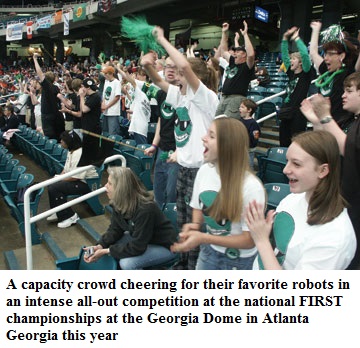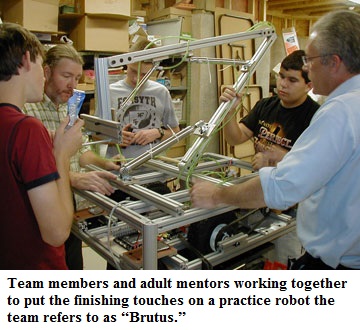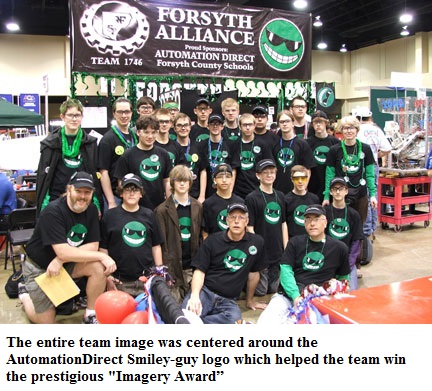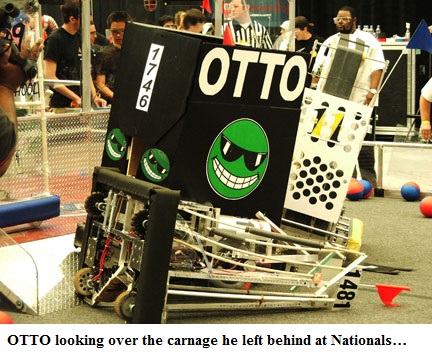Imagine a world where kids put engineers and scientists on the same pedestal as rock stars, athletes and actors…
Imagine a world where ordinary people do extra-ordinary things and are recognized for their achievements…
Imagine a world where being gracious, professional and cooperative are held in the highest regard…
Imagine a world where academics are taken from the classroom and put into a fun and engaging sports-style venue where hundreds of thousands of people can watch, participate and enjoy the thrill of what can be created by an enabled mind…
 You don’t have to imagine this, it is already happening in a town near you. It is the primary mission of a program called FIRST – For Inspiration and Recognition of Science and Technology. FIRST is an incredible activity where students from elementary school through high school are engaged in a worldwide robotics competition that teaches them about real world engineering and technology while emphasizing community, partnership with business, helping others and being gracious, professional, and cooperative, at all times.
You don’t have to imagine this, it is already happening in a town near you. It is the primary mission of a program called FIRST – For Inspiration and Recognition of Science and Technology. FIRST is an incredible activity where students from elementary school through high school are engaged in a worldwide robotics competition that teaches them about real world engineering and technology while emphasizing community, partnership with business, helping others and being gracious, professional, and cooperative, at all times.
This is all made possible by companies who volunteer technical expertise, funding, and supplies so participants can have the best possible experience in a positive, exciting venue that fosters the desire to learn, to grow and to become better people.
About FIRST…
“The hardest fun ever!”
Founded by Dean Kamen (inventor of the Segway), FIRST is a multinational non-profit organization that aspires to transform culture by making science, math, engineering and technology as cool for kids as sports are today. Dean Kamen saw the need in the U.S. to encourage elementary, middle, and high school students interested in technology by providing a sports-oriented competition that would combine the excitement of sports and current technology in a way that would create a union between the school and community. “We want to show kids that it is more fun to design a video game than it is to play one!” says Dean.
FIRST operates three levels of competition: FIRST Robotics Competition (FRC) for high school students, FIRST Vex Competition (FVC) primarily for late middle and early high school students, and FIRST Lego League (FLL) forelementary and middle school students. These programs are sponsored and assisted by local companies and volunteers.
AutomationDirect stepped forward to sponsor the team and provide guidance, technical help, and supplies. Major corporations who have been involved for many years include Ford, GM, GE, Coca-Cola, Turner Broadcasting, Microsoft, Rockwell, NASA, Kimberly-Clark, Siemens, Honeywell, Boeing, Bell South and Google. All of these companies recognize the importance of getting youth interested in engineering and technology and dedicate incredible amounts of funding and support for this activity.
What Is A Typical FIRST Robotics Competion Build Season Like?
A microcosm of the real engineering experience, plus much more.
Most teams spend their fall semester fundraising and learning about robotics technology to prepare for the big event. For example: the Forsyth Alliance, an AutomationDirect sponsored team, spent 22 weeks, twice a week after school, learning about transmissions, gear boxes, torque, moments of inertia, embedded programming, sensor technology, manufacturing techniques, pneumatics, solenoids, compressors, electronics, schematics, etc. They even learned how to print their own T-shirts and how to weld. Then they built four different kinds of robots, all to prepare for the competition.

In January of each year, FIRST announces the competition. It is intentionally different each year to level the playing field between older, more experienced teams and new teams; they all have to start fresh each time. Each team is given several bins of wires, motors, gears, processors, sensors, metals, and NO INSTRUCTONS! From the moment of the announcement, the teams have 42 days to design, build, test, and ship a robot capable of competing in the game.
Following the build season, there are 33 regional competitions, each supporting an average of 50 teams. Winners from the regional events are eligible for the National competition where they compete against the best teams from around the world.
FIRST Teaches Values
It’s fun. It’s exciting. And the learning lasts a lifetime.
The build season is one of the most intense activities these students will ever be part of. The challenge of developing a full engineering design in an environment where there is not enough time, money, resources or materials is similar to real-world engineering. The only thing that is certain is the six week deadline – if you miss it, you are out of the competition.
While building the robots, students learn about marketing, budgeting, design methodology, technology and time management, all under the supervision of adult mentors who dedicate incredible amounts of time to these students. It is a tremendous enterprise where students experience the real value of teamwork, dedication and commitment.
The FIRST competition is unique in the fact that winning the game is NOT the highest award that can be earned. The highest awards are presented to the teams that do it right – those demonstrating cooperative, gracious and professional behavior. The teams that dedicate themselves to community outreach, helping others get excited about engineering and technology, are held in the highest regard, as well as teams demonstrating leadership, innovation and a winning attitude. All are values that the parents want their kids to be exposed to and grow up with.
What Is The Forsyth Alliance?
 FIRST motivates youth to pursue engineering/technology careers.
FIRST motivates youth to pursue engineering/technology careers.
In August 2005, a local engineer and a high school math teacher got together and started FIRST Robotics Competition team in Forsyth County, Georgia so their sons and others would have an opportunity to learn about and enjoy the exciting fields of engineering, science and technology in an environment that could not be provided by typical school programs. The team quickly grew to nearly two dozen excited students from around the county. There was some concern that high school rivalries might prevent them from working cooperatively, but the kids cast their differences aside and worked well together from day one. They even modified schedules, meeting times, and team organization so everyone could participate. Remember – Cooperation, Teamwork, Dedication.
How Is The Forsyth Alliance Doing?
The first regional for the 2006 season was held on March 16-18, 2006, at the Gwinnett Civic Center, just north of Atlanta, Georgia. The team was a bundle of nerves. Did they remember everything? Will the robot survive the rigors of this extremely physical game? How will they stack up against the other teams? Did they have contingencies for mechanisms that might fail? So many questions and self doubts can be overwhelming for a young, inexperienced rookie team.
 And, to make matters worse, the Forsyth Alliance robot didn’t look like any of the other robots. Did they do something wrong? A quick check of the rule book confirmed that their robot “OTTO” was within the guidelines. While most robots looked like mobile piles of metal, gears, wheels, and structural components, the Forsyth Alliance decided to put effort into packaging the robot to present a functional design that was unique and memorable. The result was a large black box that used the AutomationDirect green Smiley-guy logo to create an identity that the audience could relate to. The name “Otto” was to honor the team’s sponsor: “Otto-mation Direct.”
And, to make matters worse, the Forsyth Alliance robot didn’t look like any of the other robots. Did they do something wrong? A quick check of the rule book confirmed that their robot “OTTO” was within the guidelines. While most robots looked like mobile piles of metal, gears, wheels, and structural components, the Forsyth Alliance decided to put effort into packaging the robot to present a functional design that was unique and memorable. The result was a large black box that used the AutomationDirect green Smiley-guy logo to create an identity that the audience could relate to. The name “Otto” was to honor the team’s sponsor: “Otto-mation Direct.”
In addition to packaging the robot, the team also built an identity around the Smiley-guy logo. The team booth, uniforms and marketing materials sported the Smiley graphic.The strategy and all the endless hours of hard work paid off. Otto was a hit at the regional competition and made it all the way to the semi-finals. The team won the prestigious IMAGERY Award, which recognizes attractiveness in engineering and outstanding visual aesthetic integration from the machine to team appearance (and is usually won by teams with many years of experience).
The best moment came when it was announced that the Forsyth Alliance had won the ROOKIE ALL STAR award – the single highest award a rookie team can win. This award “celebrates the rookie team exemplifying a strong partnership effort, as well as implementing the mission of FIRST to inspire students to learn more about science and technology.” This honor also rewarded the team with an invitation to the national competition in Atlanta where the Forsyth Alliance would compete against all the top teams in the world.
At the Nationals, instead of the 40 to 50 teams typically found at a regional, there were over 340 teams in the competition. The event filled the Georgia Dome and the World Congress Center with competition arenas and pit areas. There were robots as far as the eye could see.
 The competition was intense and the abilities of these world class robots were impressive. Even so, the Forsyth Alliance and OTTO held their own. The Forsyth Alliance was the only team from Georgia to bring home a major award; they ranked in the top third of their division and were one of the top rookie teams present. To top it all off, the Forsyth Alliance won the Imagery Award for the entire competition – the most outstanding visual aesthetic integration in the world! It was especially gratifying when the team realized that no rookie team had ever won this prestigious award.
The competition was intense and the abilities of these world class robots were impressive. Even so, the Forsyth Alliance and OTTO held their own. The Forsyth Alliance was the only team from Georgia to bring home a major award; they ranked in the top third of their division and were one of the top rookie teams present. To top it all off, the Forsyth Alliance won the Imagery Award for the entire competition – the most outstanding visual aesthetic integration in the world! It was especially gratifying when the team realized that no rookie team had ever won this prestigious award.
As the tired and exhausted team headed home, their hearts were filled with pride and their minds were already making plans for next year. This was one of the most significant and memorable events of these young kids’ lives and it was all made possible by the dedicated mentors and the incredible support provided by AutomationDirect.
They can’t wait for next year!
For more information, please contact the mentors of the Forsyth Alliance:
Rick Folea rfolea@bellsouth.net Lead Engineering Mentor
Rusty Ray RRay@forsyth.k12.ga.us Lead Team Mentor
Also visit the following websites:
Team Website: www.ForsythAlliance.com
FIRST Website: www.USFIRST.org
By Rick Folea and Rusty Ray
Originally Published: June 1, 2006

